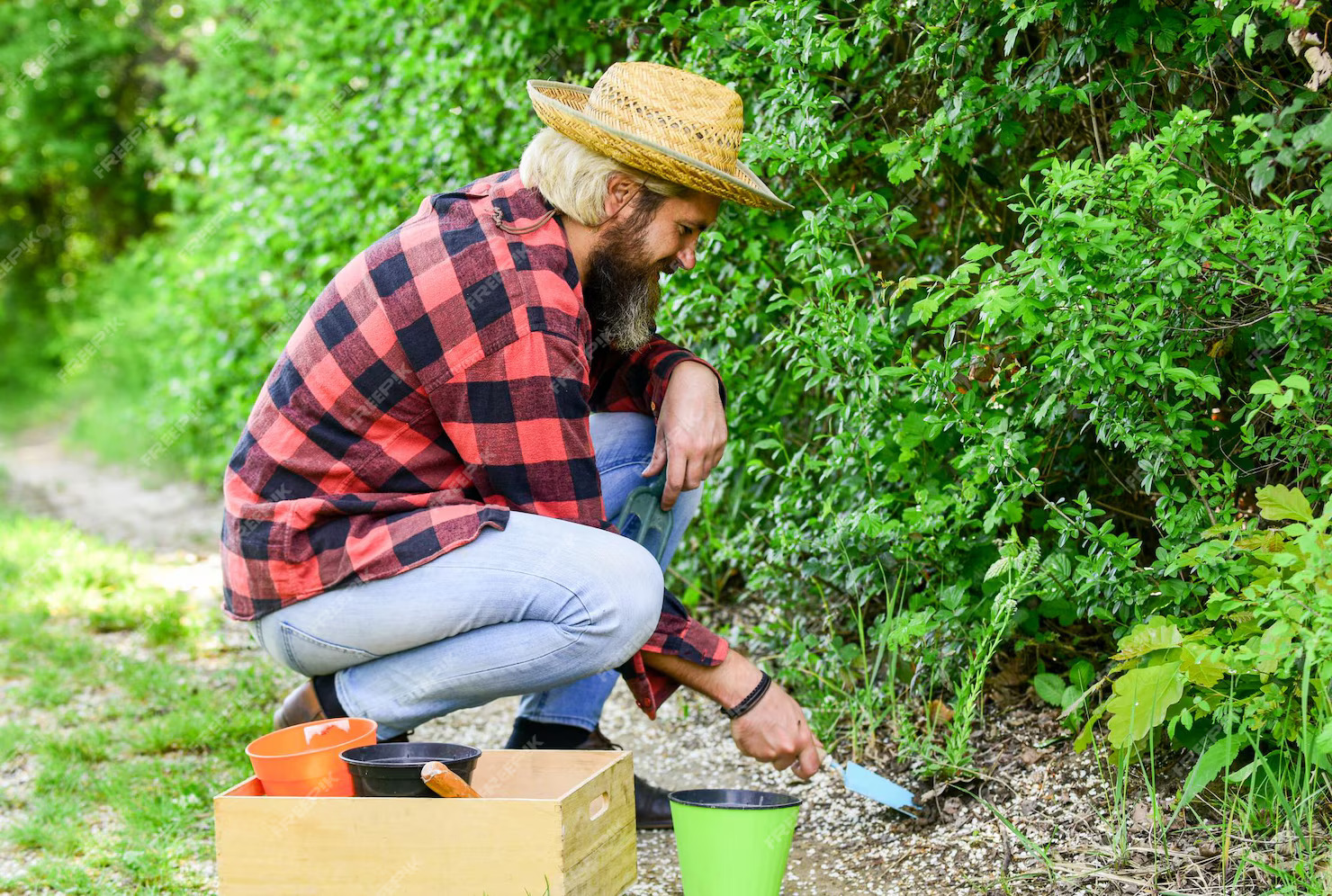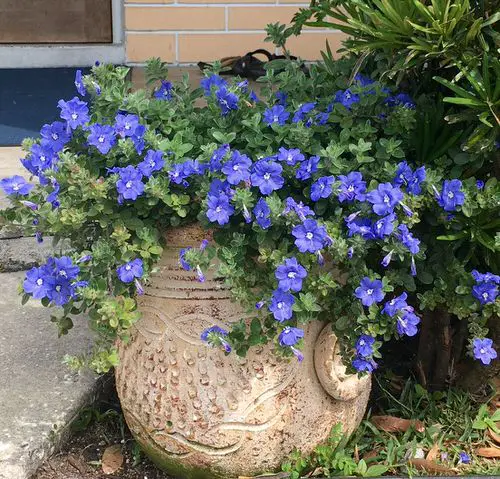Learn How to Grow Evolvulus Glomeratus and flaunt its pretty blooms anywhere! Read on to know all about Growing Dwarf Morning Glory.
Here are all the details on How to Grow Evolvulus Glomeratus in hanging baskets, containers, or raised beds. The Dwarf Morning Glory is a great choice for small spaces like a balcony or a patio!
Botanical Name: Evolvulus glomeratus
USDA Zones: 8-11
Check out the best varieties of Morning Glory Flowers
Dwarf Morning Glory Plant Information
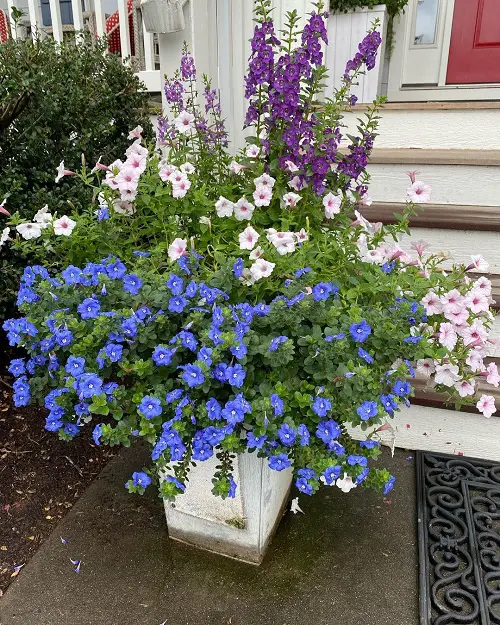
Dwarf Morning Glory is also called Blue Daze. It produces rare blue flowers over a mat of silver-green, a mat of fuzzy, oval-shaped leaves. Usually, Evolvulus Glomeratus is grown as a sturdy perennial in warmer zones and as an annual in colder places.
Evolvulus Glomeratus belongs to the Morning Glory family, and the flowers shut on cloudy days, in the hot afternoon sunlight, and at the end of the day. However, it is a mounding, low plant, not a climber like the Morning Glory. The fast-growing plant can reach blooming maturity in 4-6 weeks.
Find out the Amazing Indoor Flowering Plants for Hanging Baskets
How Long Does a Dwarf Morning Glory Flowers Last?
The Dwarf Morning Glory blooms last from spring to the end of summer. The plant needs protection from frost. You will need to cover the plant using a medium layer of mulch.
Best Dwarf Morning Glory Varieties
Blue My Mind, Purple Temptation, Snow Storm, Strawberry Sundae, Apricot Sky, Pink Star, White Out, and Heavenly Blue are some of the varieties you can grow.
How to Grow Evolvulus glomeratus from Seed
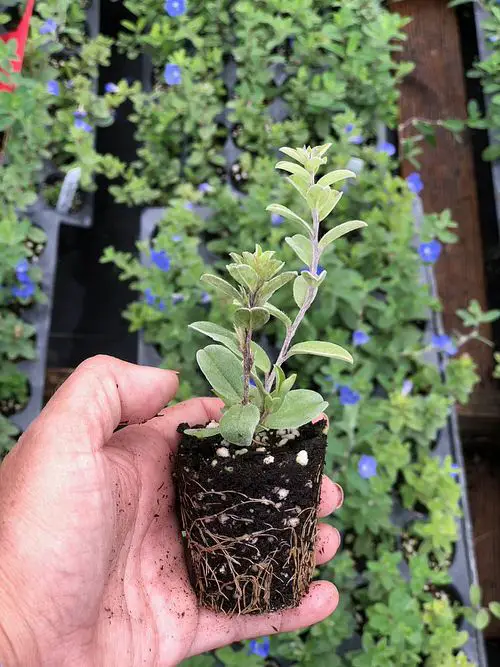 You can start Evolvulus Glomeratus seeds indoors 8-10 weeks before the last frost date. If you live in a warm area, you can plant it outdoors at any time of the year. Follow these steps:
You can start Evolvulus Glomeratus seeds indoors 8-10 weeks before the last frost date. If you live in a warm area, you can plant it outdoors at any time of the year. Follow these steps:
- Plant the Evolvulus Glomeratus seeds in a small container filled with seed starter medium. Alternatively, you can mix 1/4 standard potting mix and sand.
- Keep the medium evenly moist, and then set the pot in a bright, sunny location indoors.
- Ensure that the temperature range is between 65-75°F or 18-23°C.
- Also, put a clear plastic bag to cover the tray or pot, but uncover it for 20-30 minutes daily for fresh air.
- When you notice each plant has 3-6 sets of true leaves, you can transplant each of them into separate, individual containers.
- Now, you can grow them outdoors after the danger of frost is over.
Here are the best types of Bromeliad you can grow indoors
Requirements for Growing Evolvulus Glomeratus
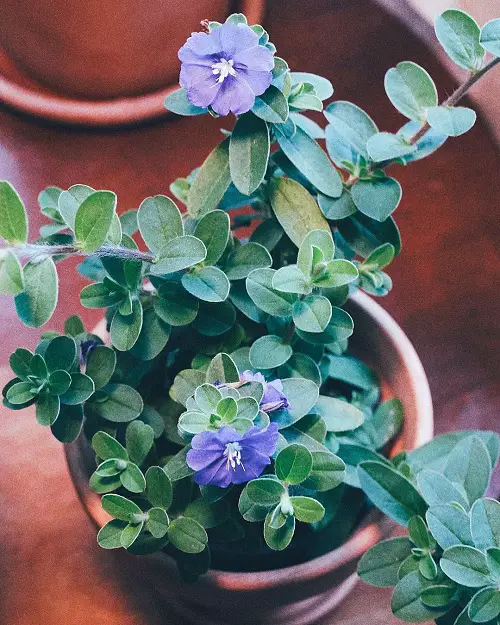
Light
Grow Evolvulus Glomeratus in a spot that receives full, direct sunlight for 6-8 hours daily to boost non-stop flowering throughout the season. Avoid planting it in too much shade, as it will discourage flowers and lose the glossiness of its foliage.
Soil
This plant works best in loamy, average, well-draining soil in pots or garden beds. It loves slightly acidic soil but can tolerate neutral soil, too.
For best growth, add plenty of organic matter and compost in the growing medium when planting. Adding a layer of mulch will help keep the soil from drying out and help control weeds.
Water
Evolvulus Glomeratus prefers consistently moist soil, so it is important to water the plant regularly. During hot weather, it should be watered deeply at least once a week, allowing the soil to dry out slightly between waterings.
In cooler weather, water only when the top inch of soil is dry. Avoid overwatering, as this can cause root rot and other issues.
Temperature and Humidity
Grow Dwarf Morning Glory in a temperature range of 65-95°F or 18-34°C and avoid mild frost. This beautiful plant does not prefer humidity and works best in average humidity levels of 30-50 percent.
Evolvulus Glomeratus Care
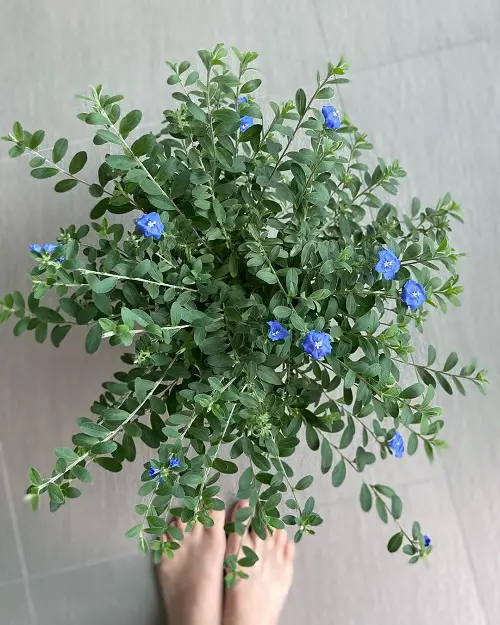
Fertilizer
A slow-release balanced fertilizer with an NPK ratio of 10-10-10 or 20-20-20 can be applied in spring and late summer. You can also dilute the feed to 1/2 of its recommended strength and use it once in 4-5 weeks to encourage blooms.
Avoid over-fertilizing Evolvulus Glomeratus, as this can cause leaf burn and root damage.
Pruning
Pruning encourages vigorous growth, creates a denser plant, and can help to reduce pest and disease problems.
To prune Evolvulus Glomeratus, use sharp pruning shears to cut back any dead or dying stems. Pinch off any new growth to prevent the plant from becoming leggy.
Also, prune off any dead flowers or flower stalks to encourage new flowers to form. Pruning should be done in the late winter or early spring before new growth begins.
Pests and Diseases
Pests:
–Mealybugs
–Aphids
–Whiteflies
Diseases:
-Powdery mildew
-Root rot
-Leaf spot
-Stem rot
- Avoid planting Evolvulus Glomeratus in areas that are prone to excessive moisture.
- Remove infected or heavily infested plants from the garden.
- Make sure to keep the area around the plant clean.
- Plant Evolvulus Glomeratus in well-drained soil and keep the soil pH around 6.5.
- Prune the plants regularly to improve air circulation and reduce the chances of fungal infections.
- Monitor the plant regularly for any signs of diseases or pests.
- Use an insecticidal soap or a neem oil solution to get rid of pests.

